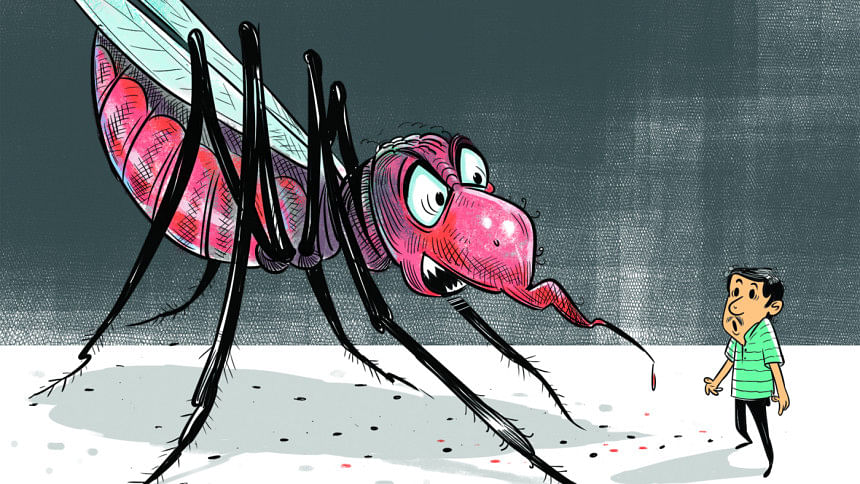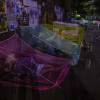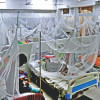Dhaka’s darling dengue diaries

Ah, summer in Dhaka. That magical time of the year when mangoes ripen, lychees flood the bazaars, and humidity smothers you, and everyone's plus-one to picnics, school events, and family dinners is—you guessed it—dengue fever. As if melting into a puddle of sweat in this heat was not enough, you also have to embrace the skeletal-level weakness that makes lifting your head off a pillow a herculean feat.
Yes, while other countries boast cherry blossoms and beach holidays, we get a yearly VIP visit from the Aedes mosquito. It doesn't just bite—it makes your body buckle into absolute stupor. These mosquitoes have better timing than airlines (not saying much, but still) and a more efficient delivery system than the local food delivery services.
At this point, let's stop pretending that dengue is a health crisis. It's a lifestyle. You don't get dengue—you host dengue. It arrives uninvited, overstays its welcome, and leaves you broke, exhausted, and contemplating your life choices. Think of it as a relative from hell, but airborne and slightly more bloodthirsty. The cost of the blood tests alone is doing much to my blood pressure.
The symptoms? Fever, joint pain, headache, rashes—and a newfound intimacy with hospital waiting rooms. And the cure? Well, mostly papaya leaf juice, blind optimism, and your mum whispering, "InshaAllah bhalo hoye jaba" while pouring coconut water down your throat like she's exorcising the virus.
Hospitals? Overcrowded. IV drips? Shared like a plate of pakoras. Beds? Optional. In fact, dengue is the only illness where being sent home to "rest" means you're not sick enough to die yet. Congratulations!
Meanwhile, the government launches their annual dengue awareness campaign which is critically sidelined by the who-will-be-our-new-mayor crisis: posters that no one reads, fogging drives that look suspiciously like stage smoke for a low-budget jatra, and public health officials assuring us on TV that "the situation is under control," while behind them someone faints from a platelet count that's trying to set a new limbo record.
And the fogging? Oh, the fogging. It's less a public health intervention and more a dramatic theatre. A man in a mask emerges from an alley like a rejected Ghostbuster and blasts out enough chemical mist to either kill a mosquito or awaken your childhood asthma. Meanwhile, the mosquitoes shrug it off like seasoned Dhakaites navigating a waterlogged street—nice try, bhai, but we're built differently.
Local authorities always seem shocked by the yearly outbreak, as if dengue RSVPs in invisible ink. Every year, it's the same drill: act surprised, scramble for beds, pretend that fogging works, and give interviews about "raising awareness"—which, if you're wondering, now includes TikTok videos of teenagers doing the dengue dance. (Spoiler: the mosquitoes are not impressed.)
But we, the Bangladeshis, are resilient. We'll fight dengue with a bottle of Dettol, a plastic racket that makes zapping sounds but kills nothing, and a fervent belief that neem leaves solve everything.
And let's not forget the elite response. In Gulshan, you'll find people consulting homeopaths, importing organic mosquito nets from Switzerland, and applying lavender oil as "a natural repellent." In contrast, in Mirpur, your dad is wearing jeans indoors and whacking the air with a sandal, yelling, "Ekta merechhi!" with the confidence of a man who's declared war on an invisible enemy while armed only with rage and footwear.
The mosquitoes, of course, are thriving. They aren't just insects; they're trained operatives. They dodge coils, laugh at sprays, and develop immunity faster than your cousin fake-cried for a vaccine exemption. One bite and you're down. Two bites and you're on saline. Three bites and you're asking your doctor if he takes bKash.
So, what's the long-term plan? Trick question—we don't have one. Our dengue strategy is like a poorly managed relationship: deny, ignore, panic, repeat. No proper drainage system. No nationwide mosquito control. But hey, at least the fogging guy gets a yearly performance review.
And yet, we endure. Because in Bangladesh, illness is not just a physical condition; it's a communal experience. Neighbours bring fruits, your bua gossips about which auntie gets it next, and every family member becomes a medical expert armed with Google and two teaspoons of misinformation.
So, here's to dengue, our unwanted summer guest, our viral nemesis, our yearly reminder that in Dhaka, you're never truly alone. Not with mosquitoes in your bedroom, in your shower, and possibly in your group chat.
Cheers to another season of itching, sweating, and trying to remember which body part you haven't already slapped. If dengue had a flag, we'd probably hoist it. After all, what's a Bangladeshi summer without a little fever, fear, and a nationwide fog machine that doubles as a vibe check? Welcome to the tropics. We may be drowning in mosquito larvae, but at least we're doing it with style and some frizz.
Barrister Noshin Nawal is an activist, feminist, and a columnist for The Daily Star. She can be reached at [email protected].
Views expressed in this article are the author's own.
Follow The Daily Star Opinion on Facebook for the latest opinions, commentaries and analyses by experts and professionals. To contribute your article or letter to The Daily Star Opinion, see our guidelines for submission.

 For all latest news, follow The Daily Star's Google News channel.
For all latest news, follow The Daily Star's Google News channel. 








Comments